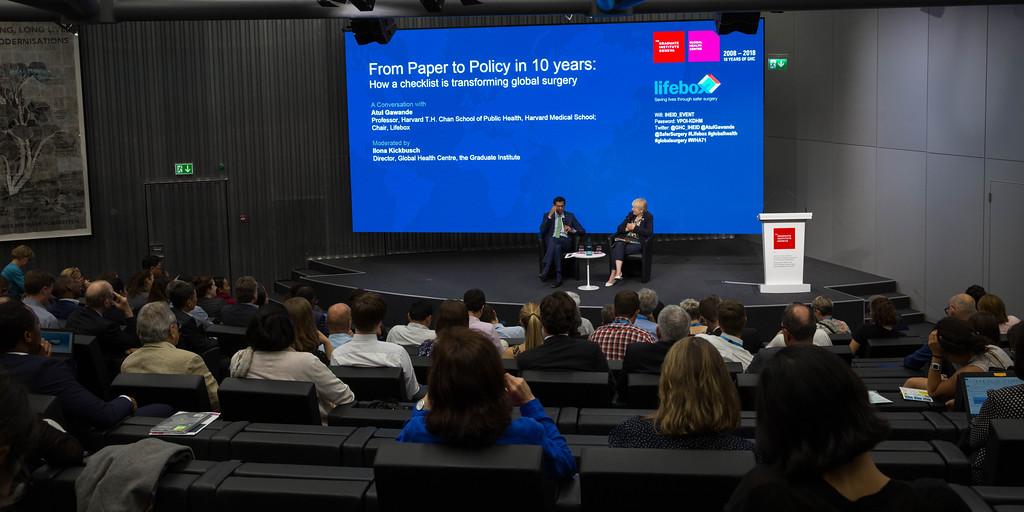Crew on each of the hundreds of airplanes landing safely in Geneva every week must complete a pre-flight checklist, designed to improve communication and reduce risk. This is aviation’s response to surgeon and The New York Times best-selling author Professor Atul Gawande’s long-standing fascination: “failure, and the systems that protect against it”.
Failure was the first topic of conversation for Gawande and Professor Ilona Kickbusch when they sat down in front of a packed audience at maison de la paix back in May to discuss his work, theories of systems change, and where those avenues meet in responding to a rising public health crisis: unsafe surgery.
In an age when more people die from surgically treatable conditions than from communicable diseases, but 5 billion people still lack access to safe surgical care, there is a critical need to develop scalable systems that can work more effectively. Ten years ago, the aviation checklist was a major source of inspiration for Gawande and his team at the World Health Organization as they sought to tackle the problem.
“I wanted to understand what it means to be systematic,” said Gawande, of the challenge to shape more complex ecosystems - like surgical provision - in ways that can improve patient outcomes. “How do you engineer better results?”
The resulting WHO Surgical Safety Checklist is a communications-based tool for operating room teams proven to reduce complications and mortality by more than 40 percent - regardless of geography or resources. Today it is used by thousands of hospitals around the world, an “environmental systemic intervention,” as Kickbusch articulated, that benefits the participant as well as the patient.
Gawande is the chair of Lifebox, an NGO focused on improving surgical safety in lower and middle income countries (LMICs) which co-hosted the evening. The safety of surgical systems varies radically around the world - while risk of dying from anesthesia in Western Europe is around one in 250,000, in West Africa it is as high as one in 133. The Checklist is Lifebox’s organising principle for improving teamwork, anesthesia safety and infection reduction where risks are greatest and quality improvement opportunities hard to access.
Less than 2.5 percent of all research into the Checklist is focused on LMICs, meaning surgical teams facing the most extreme challenges are benefitting least from research opportunities. Important initiatives like the Surgical Equity Prize from the Challenge Centre at Nesta are beginning to recognise and respond to the scale of the problem.
Because as Gawande and Kickbusch returned to again and again in their conversation, “the reality of human vulnerability and frailty,” is universal - and realising this is fundamental to both philosophical and pragmatic approaches to population health.
“Recognising that action require[s] more than education, you need to have environmental interventions that [are] really systems interventions and [take] into account human factors was very fundamental.” Gawande explained.
Written for the GHC Newsletter by Lifebox. Lifebox is marking the 10th anniversary of the WHO Surgical Safety Checklist with a programme of research, events and advocacy. For more information, visit www.lifebox.org or follow on Twitter @SaferSurgery.


